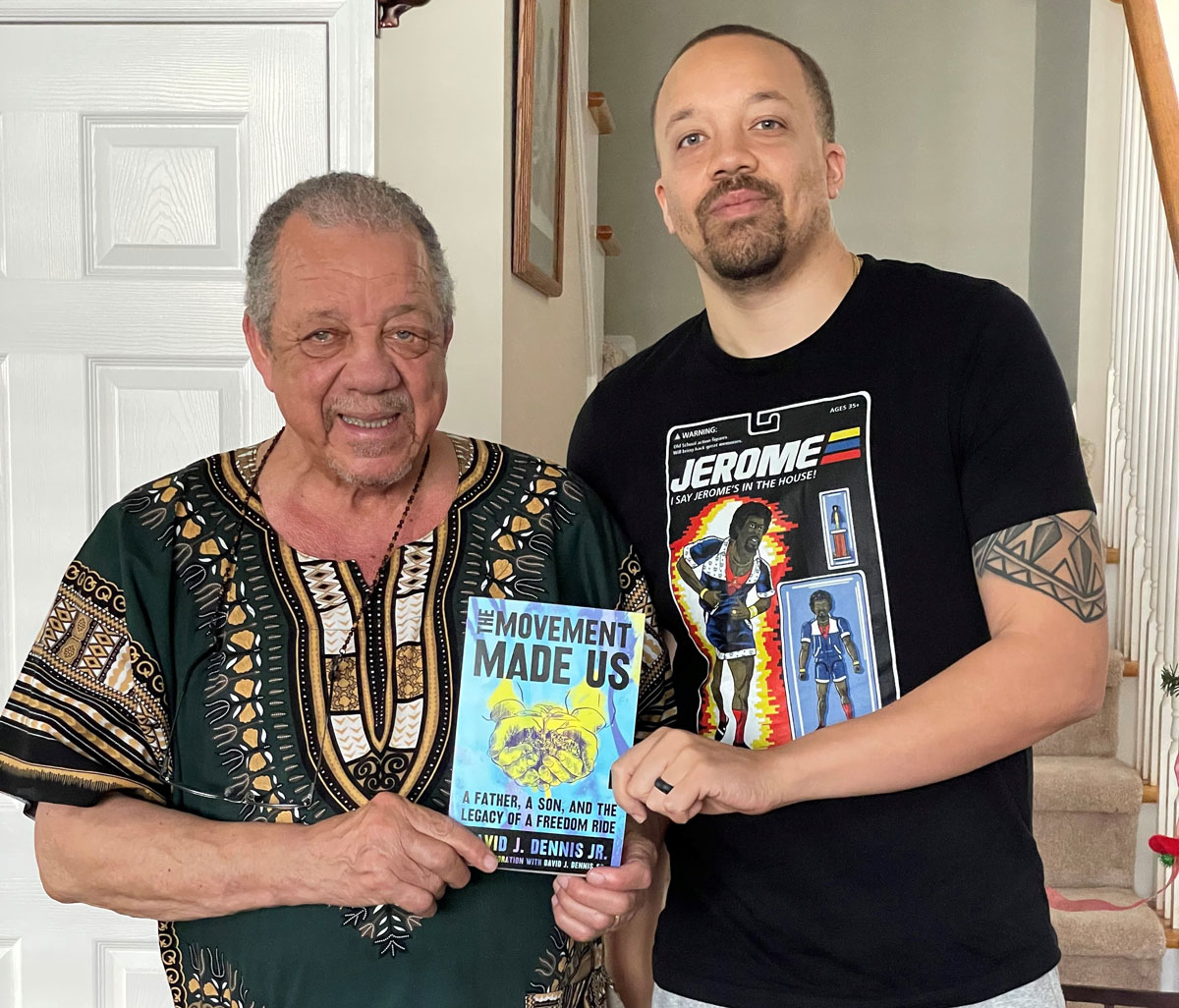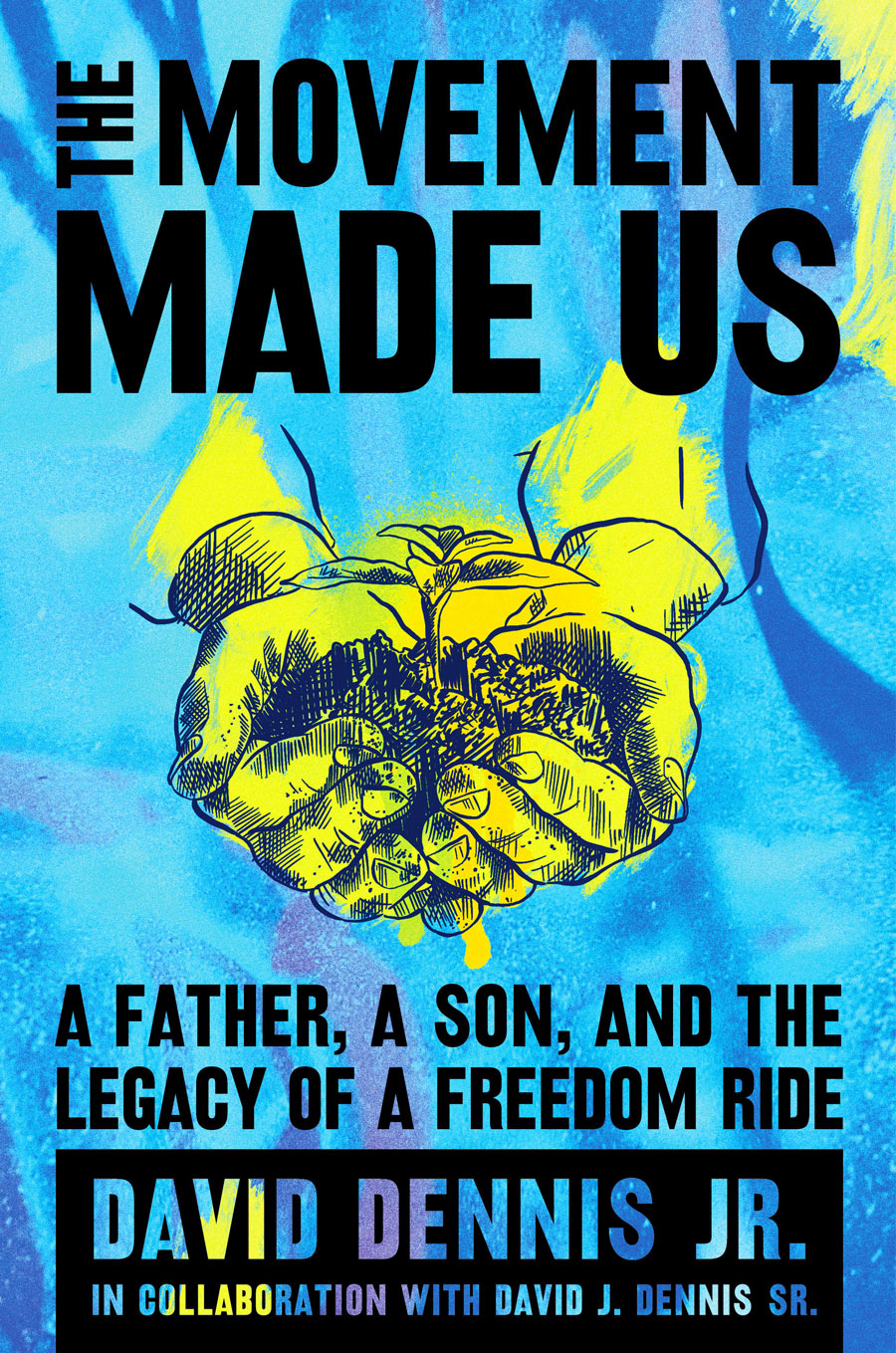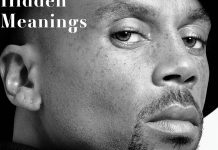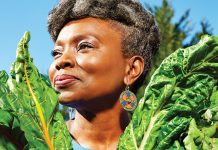
Courtesy of HarperCollins
There’s a moment in the newly released book The Movement Made Us (HarperCollins) where David Dennis, 81, reflects on the emotional numbness he experienced after the deaths of civil rights activists James Chaney, Andrew Goodman and Michael Schwerner. Dennis was set to travel with the men to Neshoba County, Mississippi to talk with members of a Black church that had been burned, but he was sick with bronchitis. They insisted he stay home to recover. Chaney, Goodman, and Schwerner were subsequently arrested and, upon their release, abducted and murdered. Dennis, an activist and leader of the organization Congress of Racial Equality (CORE) with which the three men were associated, still lives with the guilt of feeling like he sent them to their deaths.
In the weeks that followed, Dennis said he grew emotionally distant as a means of coping with the incident. When a group of activists told him their car had been shot at, he reacted by nonchalantly telling them to get back to work. It’s a heartbreaking, albeit completely understandable moment, given the trauma he’d experienced: A year prior to the murders of Chaney, Goodman, and Schwerner, Dennis’s friend and activist Medgar Evers was murdered outside of his home, where inside his wife and children were awaiting his return. Dennis had developed a necessary callus as a result of the constant death he’d encountered.
Dennis’s son, Atlanta-based writer David Dennis Jr., grapples with his father’s survivor’s guilt throughout The Movement Made Us, which is mostly told through his dad’s perspective. The book chronicles his father’s journey into activism, starting with the initial CORE meetings he attended while in college and leading up to the 1964 Freedom Summer in Mississippi, where activists worked to draw attention to the racial violence and disenfranchisement experienced by Black locals. The book chronicles how participating in the Freedom Rides—and feeling as though he was willing to die in the fight for equality—was the first time Dennis truly felt he was engaged in activism. It also showcases his encounters with activists such as Martin Luther King Jr. and Fannie Lou Hamer. The book also shows how Dennis Jr. struggled to understand the gaps in his relationship with his father due to the trauma Dennis had encountered as an activist.

Courtesy of HarperCollins
During a chat with Atlanta, Dennis Jr. says his father didn’t want to be seen as a hero. He was, in his eyes, just a young man with an unshakable resolve for equality who had assumed the heavy burden of leadership. Sometimes he made the wrong decisions. Most of the time, though, there wasn’t really a “right” decision.
The burden of PTSD is that it can cause people to minimize their experiences as a way to cope with the overwhelming trauma they’ve endured. Dennis Jr. recognized this, even if his father still struggles to. With The Movement Made Us, he reveals the national impact that activists such as his father had, but he also reminds us of the generational implications of being raised by a man who was fighting a war within his own country.
In the process of working on this book, how did you reconcile the fact that we as humans have faulty memories? There are things we remember differently over time, and, for this book, you’re talking to people who are older and have been through a lot of trauma.
I know everything in the book happened, but I do think what Dad does not remember or remembers imperfectly is a part of the story. He has a pretty spot-on memory. When I go to double check the things he’s said, it’s mostly pretty accurate. But there are just certain blanks. The few days around when Medgar Evers was killed, Dad doesn’t remember whole swaths of stuff happening. It was one of the most traumatic things that’s ever happened to him. There’s a lot of space given to that imperfection in the book. It’s backed by research, but we’re still trying to put this tapestry of stuff together.
One of the things both you and your father grapple with throughout the book is attaching the worth of activism work to how much trauma you’ve endured. For instance, the moment your dad saw himself as really committed to the movement was when he was ready to die for it. But, he was doing movement work before then. How did writing help you work through this?
A lot of this was written in the George Floyd era, and I was sort of unsettled by hearing this hierarchy of who has done more to get us free. This idea that, you weren’t tear-gassed or put in jail, so you can’t be a part of this. That’s not how we should value the work. One of the things we try to hammer home is that there’s a lot of folks where the movement would not have succeeded without them, even if they just donated one thing or housed one family.
Can you talk about how you decided the structure of the book? Your voice comes in the form of letters in between the chapters that are written from your dad’s perspective.
At the very beginning, I wanted to mute my voice as much as possible. I didn’t feel like I deserved to be on the same page as my dad. The letters came last. I wrote a whole lot of really, really, really, really bad essays that we kept scrapping because I couldn’t find my voice, which I thought would be the easiest part. I write essays all the time.
I’m better when I write from a place of authority. To do that, you have to be sure of stuff, and I was writing about a lot of stuff I wasn’t sure about. I didn’t have the guts to find those answers for myself, such as how my relationship with my dad impacted me as a dad and husband. I had to really dig and do some soul-searching and then write. After the first draft of the manuscript, I was like, let me try [writing] letters. It was so personal that it felt better just talking directly to my dad and, then at the end, [my] kids. But it was a struggle to find where I fit in.
Was there one thing that you didn’t know about your family before writing this book that stood out for you?
I didn’t realize my childhood was formulated by this dude in his late 40s [and] early 50s finding himself and living through this trauma for the first time, which informed a lot of my childhood.
The other thing was that Dad had told all of these stories separately. I did not realize the chronology of them. Most of these things happened back-to-back or overlapped. I didn’t realize how close they were to each other where it just felt like a constant barrage of life-threatening, world-changing events for this dude who was 21-to-23-years-old.
Is this the first time you’ve talked at length publicly about the struggles you and your dad have had and the ways you had to grapple with the impact his activism had on your relationship?
This was the first time I’ve talked about our relationship publicly. I have done a lot of personal writing, but I scaled back on that once white supremacists started sending death threats. Dad is a public-ish figure, so I was fine writing about him; I was more hesitant to write about [my] kids. In the first draft of the acknowledgements, I didn’t put my wife or my mom’s names in it. I’m so used to keeping all of that secret.
How were you able to glean hope from this process?
At first I was writing an angry book. It was going to be called “I’m Tired of Funerals,” which is what my dad said in James Chaney’s eulogy. It was going to be about my dad and a bunch of his friends who are no longer here. It was going to be like, this is what y’all horrible white people did to my dad’s friends. And y’all still elected Donald Trump. And y’all are still killing us. And I’m so sick and tired of it. I hate it all. But that does a disservice to the work that was done. The value is in writing something that shows what can be done in this country, and what has been done, for us to read, remember, and realize this is exactly what we can do and build upon.













